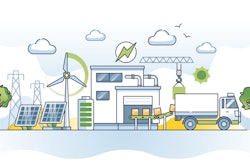
Electric vehicles (EVs) are on the rise – popularity is growing and as governments worldwide begin to halt the production of gas-powered vehicles, this upward trend is expected to continue. EVs are known for their eco-friendly, zero-emission engines and low running costs, but the cost of buying one can set you back much further than their combustion counterparts.
Although this can seem like a promising concept, it's important to ensure that you'll get your money's worth before committing to a lengthy contract, especially for a business. Due to the costly manufacturing process and high demand, monthly payments on leases or finance agreements can be quite substantial, making it hard to know whether the savings on gas will pay off.
Congestion charges
As the impact of the climate crisis becomes more apparent, various administrations are taking steps to encourage drivers to move away from combustion vehicles. In fact, the World Health Organization found that 99% of the global population now breathes air that exceeds the minimum quality guidelines. Considering the vast impact that the transport sector has on this, it’s becoming clear that steps need to be taken.
There are many new strategies in the works to help combat climate issues, perhaps one of the most common is enforcing congestion charges in built-up areas, such as large cities or urban sites. These charges are applied to any driver that enters the defined area, although the exact circumstances differ from place to place.
Some areas enforce the congestion charges during particularly busy times of day, such as rush hour, whereas others have them in place 24/7. Fortunately, in most cases, EVs that produce zero emissions will be exempt, presenting a substantial cost saving for those regularly travelling through the zones.
Additional incentives
The efforts to reduce our carbon footprint aren’t just limited to congestion charges; many governments now have incentives available to EV owners to help offset the upfront cost of the vehicles. In the US, the incentives vary from state to state, but most locations will have some kind of tax rebate or other financial incentive in place to give consumers that extra push towards zero-emission vehicles.
Some examples of the available incentives include exemptions from sales tax, rebates on the purchase of an EV and federal tax credits. When you factor in these additional incentives, the upfront cost can become more manageable, making it a more attractive option for many consumers.
More affordable to run
The main selling point for consumers is often the reduced running costs of an electric vehicle. As they run purely on electricity, charging your EV is typically much cheaper than filling a combustion vehicle. The average cost for charging an electric vehicle is $0.05 per mile, compared to $0.14 to fill your typical gas-powered alternative. This may not seem like a big difference, but the cost savings are quite significant over the lifespan of a vehicle.
This is particularly relevant for trucking companies, as their fleets drive thousands of miles on a regular basis. Previously, electric trucks weren’t a viable option due to their limited range and torque, but as technology advances, they are becoming an excellent cost-saving investment. The market is rapidly expanding, with many new extended range models already available and plenty more expected to launch in the next few years.
Reduced maintenance costs
As EVs have fewer moving parts than gasoline vehicles, there’s much less to go wrong. Where you’d normally expect to have to change the oil and spark plugs on your combustion vehicle fairly regularly, there’s no need for that with an EV. They are also equipped with regenerative braking systems, which take advantage of the vehicle’s kinetic energy and use that to recharge the battery as it brakes, reducing the wear and tear on the hydraulic brakes.
While there are still maintenance tasks that need to be performed on an EV, such as brake fluid replacement and tire rotations, these tasks are much less labor-intensive which helps to cut down on costs.
Although EVs are a more expensive investment upfront, their long-term cost-saving benefits make them a financially savvy option. Particularly as technology advances and the manufacturing process becomes more efficient, we can expect to see more affordable market entry points in the coming years. However, even as it currently stands, in most cases you can expect an EV to more than compensate for your investment. Not to mention the vast environmental benefits that come with the cost-savings, helping your wallet and our planet to build a better future.

















